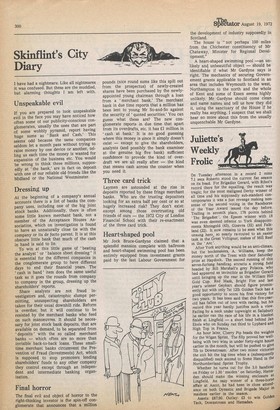Skinflint's City Diary
I have had a nightmare. Like all nightmares it was confused. But these are the muddled, but alarming thoughts I am left with.
Unspeakable evil
If you are prepared to look unspeakable evil in the face you may have noticed how often some of our publicity-conscious conglomerates, usually the ones that are part of some wobbly pyramid, report having huge sums as 'Bank and Cash.' This seems odd because the same companies seldom let a month pass without trying to raise money by one device or another, telling us each time the money is wanted for expansion of the business etc. You would be wrong to think these millions, supposedly at 'the bank,' are in fact on deposit with one of our reliable old friends like the Midland or the National Westminster.
Dressing up
At the beginning of a company's annual accounts there is a list of banks the company uses, including one of the big joint stock banks. Additionally, there is often some little known merchant bank, not a member of the Acceptance Houses Association, which on investigation is found to have an unnaturally close tie with the company or its de facto parent. It is at this obscure little bank that much of the cash in hand is said to lie.
To win at this little game of 'beating the analyst' or 'balance sheet dressing' it is essential for the different companies in the conglomerate group to have different days to end their financial years. The ' cash in hand' item does the same useful task as it goes the rounds from company to company in the group, dressing up the shareholders' reports.
Share analysts are not fraud investigators and, catastrophic slumps permitting, unsuspecting shareholders are taken for their usual downhill ride. Reform is overdue; but it will continue to be resisted by the merchant banks who feed on such manoeuvres. It should be necessary for joint stock bank deposits, that are available on demand, to be separated from ' deposits ' with the so called merchant banks — which often are no more than invisible back-to-back loans. These smalltime merchant banks circumvent the Prevention of Fraud (Investments) Act, which is supposed to stop promoters lending shareholders' funds to any other company they control except through an independent and intermediate banking organisation.
Final horror
The final evil and object of horror to the right-thinking investor is t'he spin-off conglomerate that announces that a million pounds (nice round sums like this spill out from the prospectus) of newly-created shares have been purchased by t'he newlyappointed young chairman through a loan from a 'merchant bank.' The merchant bank in due time reports that a million has been lent to young Mr So-and-So against the security of' quoted securities.' You can guess what these are? The new conglomerate reports in due time that apart from its overdrafts, etc. it has E1 million in 'cash at bank.' It is no good guessing where this money is since it simply doesn't exist — except to give the shareholders, analysts (and possibly the bank examiner at the genuine big five bank) sufficient confidence to provide the kind of overdraft we are all really after — the kind that means cash across the counter when you need it.
Three card trick
Laymen are astounded at the rise in deposits reported by these fringe merchant banks. Who are the trusting depositors looking for an extra half per cent or so at hugely increased risk? They don't exist: except among those overtrusting old friends of ours — the 1972 City of London Financial School with their re-enactment of the three card trick.
Heart-shaped pool
Mr Jock Bruce-Gardyne claimed that a splendid mansion complete with ballroom and heart-shaped swimming pool has been entirely equipped from investment grants paid by the last Labour Government for the development of industry supposedly in Scotland.
The house is " not perhaps 100 miles from the Chichester constituency of Mr Chataway, Minister for Regional Development."
A heart-shaped swimming pool —an unlikely and unbeautiful object — should be identifiable if what Mr Gardyne says is right. The mechanics of securing Governement grants applicable to Scotland in an area that includes Weymouth to the west, Northampton to the north and the whole of Kent and some of Essex seems highly unlikely. Mr Gardyne should come clean and name names and tell us how they did it, using the sanctuary of the House if he really has anything. I suspect that we shall hear no more about this from the usually unquenchable Mr Gardyne.
































 Previous page
Previous page